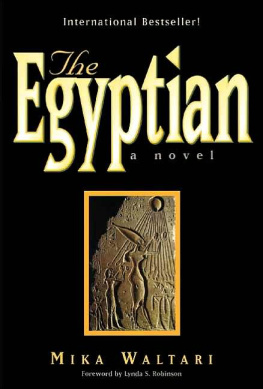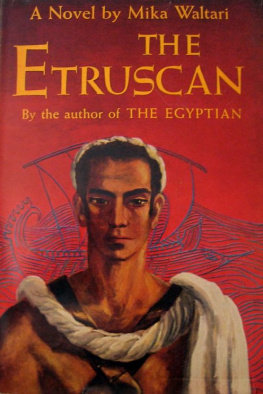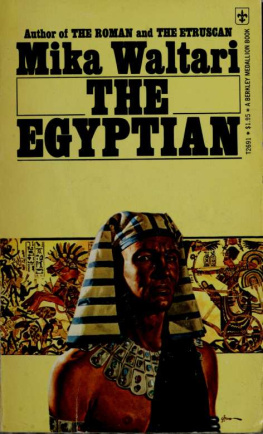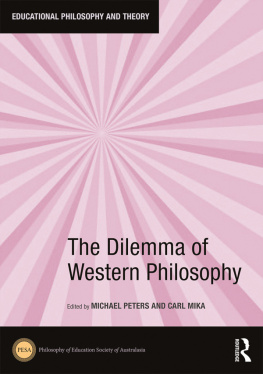Mika Waltari - The Secret of the Kingdom
Here you can read online Mika Waltari - The Secret of the Kingdom full text of the book (entire story) in english for free. Download pdf and epub, get meaning, cover and reviews about this ebook. year: 2016, publisher: PicklePartners, genre: Detective and thriller. Description of the work, (preface) as well as reviews are available. Best literature library LitArk.com created for fans of good reading and offers a wide selection of genres:
Romance novel
Science fiction
Adventure
Detective
Science
History
Home and family
Prose
Art
Politics
Computer
Non-fiction
Religion
Business
Children
Humor
Choose a favorite category and find really read worthwhile books. Enjoy immersion in the world of imagination, feel the emotions of the characters or learn something new for yourself, make an fascinating discovery.
- Book:The Secret of the Kingdom
- Author:
- Publisher:PicklePartners
- Genre:
- Year:2016
- Rating:4 / 5
- Favourites:Add to favourites
- Your mark:
- 80
- 1
- 2
- 3
- 4
- 5
The Secret of the Kingdom: summary, description and annotation
We offer to read an annotation, description, summary or preface (depends on what the author of the book "The Secret of the Kingdom" wrote himself). If you haven't found the necessary information about the book — write in the comments, we will try to find it.
The Secret of the Kingdom — read online for free the complete book (whole text) full work
Below is the text of the book, divided by pages. System saving the place of the last page read, allows you to conveniently read the book "The Secret of the Kingdom" online for free, without having to search again every time where you left off. Put a bookmark, and you can go to the page where you finished reading at any time.
Font size:
Interval:
Bookmark:


This edition is published by PICKLE PARTNERS PUBLISHINGwww.pp-publishing.com
To join our mailing list for new titles or for issues with our bookspicklepublishing@gmail.com
Or on Facebook
Text originally published in 1961 under the same title.
Pickle Partners Publishing 2016, all rights reserved. No part of this publication may be reproduced, stored in a retrieval system or transmitted by any means, electrical, mechanical or otherwise without the written permission of the copyright holder.
Publishers Note
Although in most cases we have retained the Authors original spelling and grammar to authentically reproduce the work of the Author and the original intent of such material, some additional notes and clarifications have been added for the modern readers benefit.
We have also made every effort to include all maps and illustrations of the original edition the limitations of formatting do not allow of including larger maps, we will upload as many of these maps as possible.
THE SECRET OF THE KINGDOM
BY
MIKA WALTARI
Translated by Naomi Walford
Contents
THE EGYPTIAN
THE ADVENTURER
THE WANDERER
A STRANGER CAME TO THE FARM
THE DARK ANGEL
MOONSCAPE and other stories
A NAIL MERCHANT AT NIGHTFALL
THE ETRUSCAN
MARCUS MEZENTIUS TO TULLIA: Greeting.
In my earlier letter, Tullia, I wrote of my journeys along the river of Egypt. I stayed in Alexandria for the winter, after waiting for you in vain until the autumn gales set in. I was childish in my lovesickness, for not the richest merchant nor the most inquisitive citizen could have visited the harbor more diligently than I to meet the ships from Ostia and Brundisium. I hovered about the harbor all day until the end of the sailing season, so that at last I became a nuisance to guards, customs officers and port officials with my inquiries.
It is true that my knowledge was hereby increased, and I learned many and varied things from distant countries; but when one has gazed out to sea in vain ones eyes begin to water, and after the last of the ships arrived I was forced to acknowledge to myself that you had failed me. It is now a year since we met, Tullia, and you persuaded me, with what I now see to have been false vows and promises, to leave Rome.
I was filled with bitterness when I wrote you that letter, in which I bade farewell to you forever and swore to sail for India, never to return. Greek kings still rule there, in strange cities: descendants of Alexanders officers. Yet already I am willing to admit that I can hardly have meant what I wrote; it was just that I could not endure the thought of never seeing you again, Tullia.
A man who has passed the age of thirty ought no longer to be the slave of his love. I have grown calmer, indeed I have, and the highest flames of my passion have died down. In Alexandria that passion led me into dubious company and caused me to wear myself out. This I do not regret, for no one can alter the course of action he has followed, or the deeds he has done. Yet all the more deeply do I know that I love you, since nothing could satisfy me. Therefore I would remind you, Tullia my beloved, that one day your flowering youth too will fade, your smooth face wither, your eyes gaze grow dim, your hair turn gray and the teeth fall from your mouth. It may be that you will then regret having sacrificed your love for the sake of ambition and political influence. For that you did love me, I am persuaded; of those oaths I can feel no doubt. Were it not so, nothing in this world would mean anything to me anymore. You loved me, but whether you love me still I do not know.
In my better hours I think that it really was for my own good only, to save me from dangerfrom losing my property and perhaps my lifethat you induced me with deceiving promises to leave Rome. I would never have gone if you had not vowed to meet me in Alexandria, where we were to spend the winter together. Many other distinguished ladies before you have made the voyage to Egypt for the winter, without their husbands, and will continue to do so if I know anything of Roman women. You could have returned home now that the sailing season has come round again. We might have had many months together, Tullia.
Instead I wore out both body and soul during those months, for a time I traveled, until I wearied of carving your name and the sign of my love on ancient monuments and temple columns. In my listlessness I even allowed myself to be initiated into the mysteries of Isis; but I must have been older and more hardened then than on that unforgettable night in Baiae, when together you and I dedicated ourselves to Dionysus. I found no such ecstasy. I cannot bring myself to believe in these priests with their shaven heads. Afterwards it simply seemed to me that I had paid too much for a very insignificant piece of knowledge.
Dont imagine that I have kept company only with priests of Isis and their temple women. I have acquaintance among players and singers too, and even among bullfighters of the circus. I have also seen some ancient Greek plays, which might well be translated into Latin, and adapted, should one desire that sort of fame. I mention all this to show that time did not drag in Alexandria. It is a capital city; more sophisticated, more faded, more devouring than Rome.
Nevertheless, I spend most of my time in the Museion, the library near the harbor. It is really a number of libraries: a group of buildings which make up a whole quarter of the town. The old men there complained to me of the wretched state of the collections, for they live in the past. They declare that the library can never regain its former glory, since Julius Caesar was besieged here and set fire to the Egyptian fleet in the harbor; for some of the library buildings were also burnt, and with them a hundred thousand irreplaceable scrolls of the works of the ancients.
Yet it took me many weeks to learn to use their catalogues and hunt down the things I wanted to read. There are tens of thousands of scrolls of annotations on the Iliad alone, to say nothing of commentaries on Plato and Aristotle, each housed in its own building. Over and above this there are countless scrolls which have never been entered in any catalogue and which probably not a soul has ever read since they were added to the collections.
For political reasons, understandably enough, the authorities were not particularly eager to search out the predictions of the ancients or even help me to find them for myself. I was obliged to feel my way by indirect questioning and win their confidence with gifts and dinners. Their grants are meager and they themselves are poor, as the wisest among the learned usually are, and as those always are who love books more than their life, more than the light of their eyes.
In this way I succeeded at last in rummaging out a whole series of predictions, both famous and forgotten, from hidden corners of the library. It is clear that in all ages, among every people, the same sort of prophecies about the future have always been made. They are all as obscure and irritatingly ambiguous as the utterances of an oracle. Truth to tell, I often set aside the whole jumble of them and lost myself in some Greek tale, with its carefree lies about travel and adventure. And then I would be seized by a desire to leave these conflicting prophecies to their fate and to write a book after the pattern of those others, but out of my own head. Yet despite my origins I am too much of a Roman to start writing anything of my own.
Next pageFont size:
Interval:
Bookmark:
Similar books «The Secret of the Kingdom»
Look at similar books to The Secret of the Kingdom. We have selected literature similar in name and meaning in the hope of providing readers with more options to find new, interesting, not yet read works.
Discussion, reviews of the book The Secret of the Kingdom and just readers' own opinions. Leave your comments, write what you think about the work, its meaning or the main characters. Specify what exactly you liked and what you didn't like, and why you think so.












